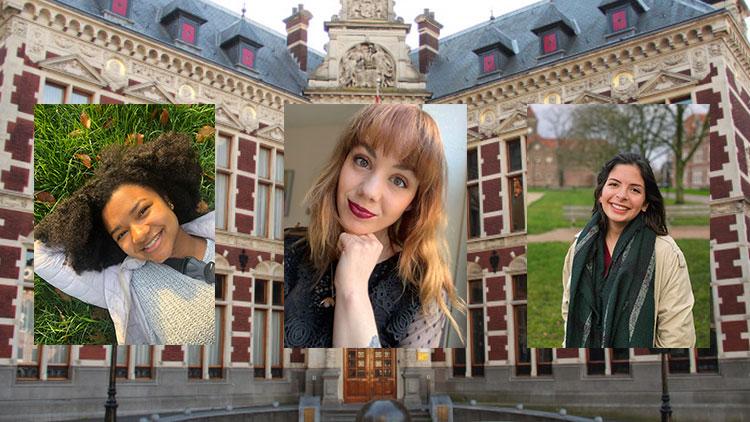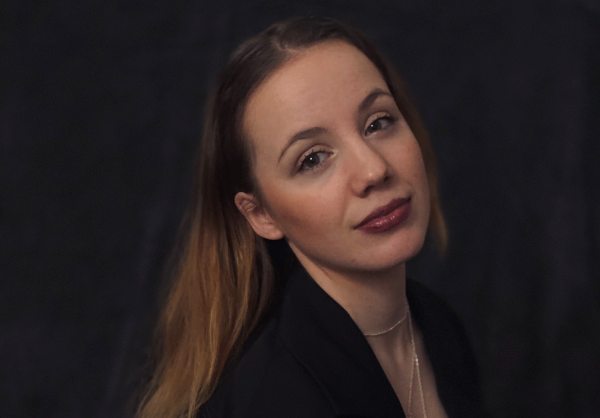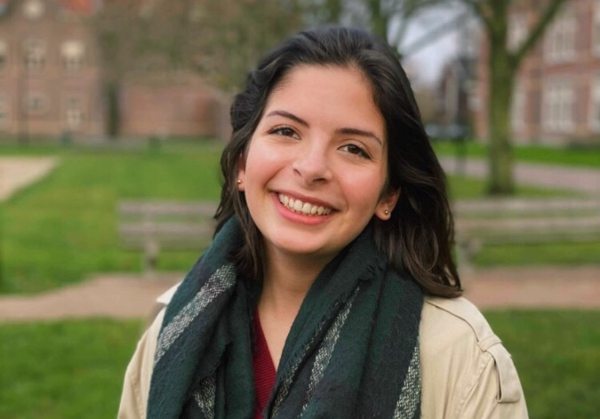‘You can feel at home at UU, but still be discriminated against’

Do you feel at home at UU? That was the question posed to seven students and one alumnus from different academic and ethnic backgrounds during the third event in the Black Lives Matter @ UU: Creating Change series, which took place online on January 27.
The main takeaway from the session: yes, one can feel comfortable somewhere, but still be discriminated against. The participants were unanimous in saying that they do feel at home at UU, however that sentence was immediately followed by a “but”. The students stressed that racism is often expressed in subtle ways, through small actions or jokes that don’t always intend to discriminate, but reveal deep-seated preconceptions – the so-called microaggressions.
They also unanimously stated that representation is key and lacking at UU. By having teachers who look like them, students of colour feel like they, too, can occupy that role. Finally, they would like to see themselves represented in the study materials, by reading and discussing a more diverse set of authors instead of sticking to an Eurocentric tunnel vision.After the event, DUB spoke with four of the participants to hear their experiences and thoughts in more detail.
 'I often get mistaken for another black person'
'I often get mistaken for another black person'
“UCU prides itself on being diverse, but it’s only diverse in terms of nationality. It’s not as racially diverse”, ponders Morgan Diakite (20), a third-year Bachelor’s student at UCU specializing in neuroscience and biology. Her mother is African-American and her father is half French, half Ivorian. Like Ragma, Morgan was used to being a minority at school, but didn’t give it much thought until she found herself on the UCU campus, where almost no one looked like her.
Even so, a fellow student once mistook her for the only other black student in the same course – an experience she’s not unfamiliar with, as it did happen before in high school. “But I didn’t see it as a microaggression then. I didn’t realise that was racially charged”.
Morgan has a hard time remembering if she ever had a teacher of colour, something she thinks would have been extremely important, especially in her formative years. “I myself had never entertained the idea of teaching. Subconsciously, that does get to you”. Now, Morgan is applying for a Master’s degree and hopes to open doors for other black women in her field.
Following the Black Lives Matter protests last summer, she decided to apply to UCU’s Diversity Committee. She also created a WhatsApp group for students of colour, which now has a dedicated Facebook page since she’ll be graduating next semester. The idea is to create a safe space for students of colour to share experiences with each other. “It currently has about forty students. I made sure to say ‘allies are welcome’, but not many white people have joined so far”.
 'Some of my closest friends are racist'
'Some of my closest friends are racist'
But white allies do exist – and one of them was present at the event. Tamara Vlajic (21), Master’s student in Global Criminology, volunteered for the panel because she believes that “a lot of white people want to do something about racism, but they don’t know where to begin”. The daughter of Serbian immigrants, Tamara grew up in Venhuizen, a small village in the province of North-Holland, and labels her awakening to racism as an “ongoing process”.
“I have never been treated differently, despite my background. And I thought – I hoped – that it was the same for many others. I have to say that I have been naive about that because, as I got older, I became more and more eligible with people around me who had racist traits". Going to the university for her Bachelor’s was an eye-opening experience for Tamara, because she had the chance to meet refugees and international students who offered her different perspectives. “One of my friends got sent back to Lybia and I just felt terrible. How come he doesn’t get the same chances we do?”.
That’s when she realised how prejudiced some of her best friends back in Venhuizen were. “They make jokes about how all Muslim people should be sent back to their country, for example. There’s an Afghan guy at the gym, his name is Muhammad. One of my friends once said: ‘he’s the only Muhammad I like’. These comments make me even question whether I want to stay friends with them”.
Asked about what that friend says about her Serbian heritage, Tamara replies: “He’s like: ‘oh, but you’re different. You’re nice’”. This type of prejudice comes back in the literature she reads for her criminology degree: ethnic minorities are often assumed to commit more crimes, even when there’s no statistical backing to that presumption. “In the future, I would like to do more research on discrimination committed by institutions, such as banks, schools, and the government”.
As for what she can do in a personal capacity, the question remains. So far, Tamara concludes, the only thing she can do is keep being vocal when she encounters extremist views. “I’m a very opinionated person, but I don’t think a lot of people dare speaking their minds like I do. But it’s important to do it, even more so now that the elections are coming. If you have a friend who plans on voting for the PVV (right-wing party best known for promoting anti-immigration views, Ed.), tell them why they shouldn’t”.
 'The whole idea of race is malleable to different contexts'
'The whole idea of race is malleable to different contexts'
Third-year UCU student Vicky Pinheiro Keulers (20) is half Dutch, half Brazilian. She grew up in a small village in Zeeland, which she defines as a “very white, rural” place. “Up until the university, I had never met anyone in the Netherlands who would call me white, ever. I was considered ‘brown’ or ‘light-skinned’ (licht getint) – which is funny, because my mom’s heritage is Portuguese, which classifies as white, right? This really shows how the whole idea of race and racism is malleable to different contexts”. In Brazil, Vicky would definitely be seen as white.
Like Tamara and Morgan, Vicky didn’t think about these things much while growing up, but the university was such an international environment that she was faced with different notions of race. “Actually, in the Netherlands we don’t really talk about race. We talk in terms of ‘non-Western allochthone’, an implicitly racialised term, which is how I’ve always been classified”. Passionate about Anthropology, she became interested in decolonial and postcolonial theory, which has ultimately led her to join UCU’s Diversity Committee.
About the event, she was surprised that students were asked to talk so openly about racism, considering that, “in a Dutch context, it’s traditionally not really something that gets talked about so publicly and explicitly”. She was also glad to have the opportunity to listen to the perspectives of different students from other faculties, as it’s not often that they get together to discuss inclusion and diversity.
The only thing she doesn’t quite agree with is the main question asked that evening: do you feel at home at UU? “I get that they were trying to encourage students to share their personal experiences with racism, but you can feel at home and discriminated against at the same time. In fact, home is precisely the place where discrimination and violence are the most insidious and harmful”. What question does she think should have been asked instead, then? “Is the university racist?”, she replies. “But I get why they didn’t do that, because in this type of discussions you also have to sway people who tend to initially get defensive about racism”.
'Our student association wants to give students a sense of belonging'
Ragma (26), currently enrolled in the Law and Economics Master's programme, grew up in a small town near Amersfoort, where her family was the only black family for a long time. Her parents are from Somalia. After being the sole black girl at school for a long time, she specifically looked for a university that would be more diverse and international. She chose Tilburg University. “The balance between male and female teachers was very good there, and there were very diverse student associations: for example, for African students, Caribbean students, Eastern European students…”
When she came to Utrecht, the first thing that stood out for her was the absence of such groups: “There’s not much creativity when it comes to student associations. Most of them are old, and they don’t look very inviting to African, Caribbean, or international students”, Ragma said during the event. The second thing that caught her attention was that the vast majority of her teachers were white, she later added in a conversation with DUB.
“UU is not really racially diverse, therefore white UU students and staff members barely see black students, if at all. This can make the environment on campus a bit uncomfortable for some students”, she notes, stressing that she thinks it’s a shame that all non-white students are placed within the same category: person of colour. “This term is very inclusive, but it takes away from our specific experience. My experiences with racism as a black woman are very different from that of a person from the Middle East or Asia, who can’t relate to that”.
For all these reasons, Ragma is creating The African and Caribbean Society, a student association celebrating African heritage by means of social and educational activities. The goal is to give students “a voice, a sense of belonging, a community: being able to get together, have discussions, help each other out with any hardships they may be facing”. What’s more, she would like the student association to help UU to solve issues concerning diversity and inclusion. The initiative is still in its early stages – Ragma is in the process of securing UU funding – but she would love to see it flourish way beyond her own student years.
“Public events may seem like a superficial effort to some, but behind the scenes, it’s not”, explains Diversity & Inclusion Advisor Laura Coello. “As a first step, the Diversity Dean and the steering committee on Diversity & Inclusion want to assess what’s going on: how students and staff experience the university. After all, UU has more than 30,000 students and 7,000 employees. It’s a huge, diverse organisation”.
Based on these events, the university is identifying the main issues students and staff would like to see tackled, who to listen to, and what content and tone to use when addressing certain topics. Not to mention the fact that events can raise awareness about structural racism at the university and society at large, Coello adds.
The UU community can therefore expect many more of these events to take place. In the third BLM @ UU event, the focus laid on the students’ perspectives. Attended by approximately 70 people, the discussion was organised by the Centre for Global Challenges and the Gender and Diversity Hub, and mediated by Assistant Professor in Gender Studies Jamila Mascat.